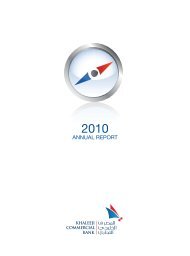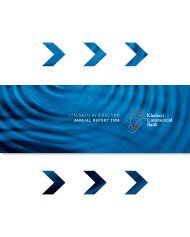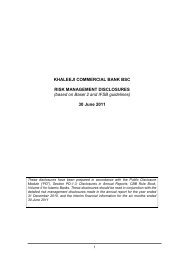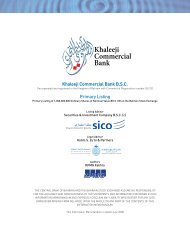2011 Annual Report - Khaleeji Commercial Bank BSC
2011 Annual Report - Khaleeji Commercial Bank BSC
2011 Annual Report - Khaleeji Commercial Bank BSC
You also want an ePaper? Increase the reach of your titles
YUMPU automatically turns print PDFs into web optimized ePapers that Google loves.
KHALEEJI COMMERCIAL BANK <strong>BSC</strong><br />
NOTES TO THE CONSOLIDATED FINANCIAL STATEMENTS<br />
for the year ended 31 December <strong>2011</strong><br />
21. CRITICAL ACCOUNTING ESTIMATES AND JUDGEMENTS IN APPLYING ACCOUNTING POLICIES<br />
The <strong>Bank</strong> makes estimates and assumptions that affect the reported amounts of assets and liabilities within the next financial<br />
year. Estimates and judgements are continually evaluated and are based on historical experience and other factors, including<br />
expectation of future events that are believed to be reasonable under the circumstances.<br />
Judgements<br />
Classification of investments<br />
In the process of applying the Group’s accounting policies, management decides on acquisition of an investment whether it<br />
should be classified as debt type instruments carried at fair value through equity or amortised cost, or equity-type instruments<br />
carried at fair value through equity or fair value through income statement. The classification of each investment reflects the<br />
management’s intention in relation to each investment and is subject to different accounting treatments based on such classification<br />
(refer to note 2 (e)).<br />
Special purpose entities<br />
The <strong>Bank</strong> sponsors the formation of special purpose entities (SPE’s) primarily for the purpose of allowing clients to hold<br />
investments. The <strong>Bank</strong> provides corporate administration, investment management and advisory services to these SPE’s, which<br />
involve the Group making decisions on behalf of such entities. The <strong>Bank</strong> administers and manages these entities on behalf of its<br />
clients, who are by and large third parties and are the economic beneficiaries of the underlying investments.<br />
The <strong>Bank</strong> does not consolidate SPE’s that it does not have the power to control. In determining whether the <strong>Bank</strong> has the<br />
power to control an SPE, judgements are made about the objectives of the SPE’s activities, its exposure to the risks and<br />
rewards, as well as about the Group’s intention and ability to make operational decisions for the SPE and whether the Group<br />
derives benefits from such decisions.<br />
Estimations<br />
Impairment of equity instruments<br />
The Group determines that equity securities carried at fair value are impaired when there is an objective evidence of impairment<br />
and there has been a significant or prolonged decline in the fair value below its cost. This determination of what is significant<br />
or prolonged requires judgment.<br />
In case of quoted equity securities, the Group considers a decline of more than 30% in the fair value below cost to be<br />
significant and considers a decline below cost which persists for more than 6 months as prolonged. Where fair values are not<br />
readily available and the investments are carried at cost, the recoverable amount of such investment is estimated to test for<br />
impairment.<br />
For unquoted investments carried at cost, the Group makes an assessment of whether there is an objective evidence of<br />
impairment for each investment by assessment of financial and other operating and economic indicators. Impairment is<br />
recognised if the estimated recoverable amount is assessed to be below the cost of the investment.<br />
In making this judgment, the <strong>Bank</strong> evaluates among other factors, evidence of a deterioration in the financial health of the<br />
investee, industry and sector performance, changes in technology, and operational and financing cash flows. It is reasonably<br />
possible, based on existing knowledge, that the current assessment of impairment could require a material adjustment to the<br />
carrying amount of the investments within the next financial year due to significant changes in the assumptions underlying such<br />
assessments.<br />
Fair value of unquoted equity securities<br />
The Group determines the fair value of unquoted investments by using valuation techniques. This includes using recent arm’s<br />
length transactions between knowledgeable, willing parties (if available), discounted cash flow analysis or market multiples<br />
for similar instruments. Fair value estimates are made at a specific point in time, based on market conditions and information<br />
about the investee companies/funds. These estimates involve uncertainties and matters of significant judgement and therefore,<br />
cannot be determined with precision. There is no certainty about future events (such as continued operating profits and<br />
financial strengths). It is reasonably possible, based on existing knowledge, that outcomes within the next financial year that are<br />
different from assumptions could require a material adjustment to the carrying amount of the investments.<br />
52<br />
<strong>Annual</strong> <strong>Report</strong> <strong>2011</strong>










